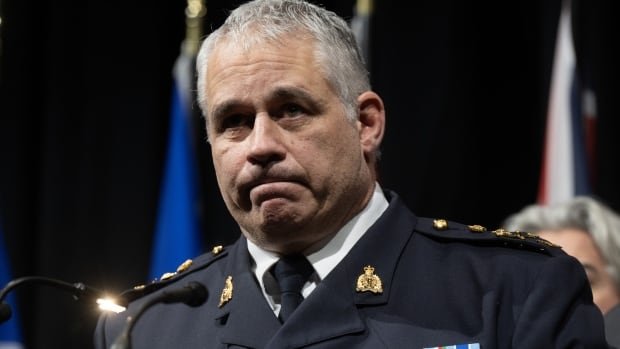The head of the RCMP said he was uneasy about the idea that politicians could use parliamentary privilege to name colleagues accused of aiding a foreign power.
Earlier this month, the National Security Intelligence Committee of Parliamentarians (NSICOP), a cross-party committee of MPs and senators with the highest level of security authority, released heavily redacted documents alleging, based on intelligence reports, that some MPs had “semi-knowingly or knowingly” participated in foreign efforts to interfere in Canadian politics.
The Royal Canadian Mounted Police have said anyone who leaks classified information could be prosecuted under Canada’s secrecy law. The Liberal government continues to face pressure from the Conservatives and others to release the names of those named in the report in the House of Commons, where lawmakers have the right to avoid arrest through parliamentary privilege.
This is not a scenario RCMP Commissioner Mike Duhem wants to consider.
“I would say it would be a challenge for us. If it were publicly released it would be different because it would be disclosing top secret information,” he said in an interview. Rosemary Barton Live.
“Let’s hope we never have to cross that road.”
RCMP Commissioner Mike Duhem told Rosemary Barton Live that it would be difficult for the RCMP if MPs were to reveal in the House of Commons the names of MPs allegedly involved in foreign interference in the NSICOP report, adding, “Let’s hope we never have to cross that road.”
Duhem said he would let the government decide how best to handle the situation, but urged caution.
“But if we start disclosing secret information, top-secret information, then I am concerned,” he said. “That could jeopardize deals and partnerships, especially international partnerships.”
Green Party Leader Elizabeth May, who had the proper security clearance to read the uncensored report earlier this month, said the report “does not contain a list of MPs who have shown disloyalty to Canada.”
NDP Leader Jagmeet Singh also read the confidential report and said he was “more convinced than ever” that some MPs were “willing participants” in foreign efforts to interfere in Canadian politics.
A party spokesman later said Singh’s remarks did not confirm or deny that the lawmakers named in the report were currently serving as lawmakers.
After the NSICOP report was released, the RCMP issued a statement saying they had “not received information regarding all of the matters outlined in the report.”
Duhem said. Rosemary Barton Live Since then, the RCMP has been in contact again with the Canadian Security Intelligence Service (CSIS) to see if there are any avenues of further investigation.
“I won’t say any more than that, but if we have the necessary information to open a criminal investigation, we will open a criminal investigation,” he said.
Information and evidence dilemma is ‘frustrating’: Duhem
In its report, NSICOP cited “numerous instances” during the investigation where intelligence agencies had not shared information with law enforcement agencies, including the RCMP.
The ministry called this a “serious flaw” and suggested a government review.
The use of intelligence information as evidence has been a long-running source of contention among Canada’s security agencies, police and courts.
The “information-to-evidence” dilemma involves balancing the need to protect sensitive information and law enforcement’s use of that information with the need to protect the accused’s right to a fair trial.
Duhem added that the RCMP and CSIS have a “good relationship,” but issues with using intelligence information as evidence have plagued both agencies for years.
“I know it can be difficult and frustrating at times,” he said.
“I think we need to bring these people, who are a lot smarter than me, to the table and see how we can separate that and bring it into a criminal investigation. But you know what? This is not a quick fix. We’ve been working on it for years.”
Chief political reporter Rosemary Barton spoke to Royal Canadian Mounted Police Commissioner Mike Duhem about why he thinks releasing the confidential information in the NSICOP report could jeopardize international cooperation, and he also discussed the future of policing in Canada.

